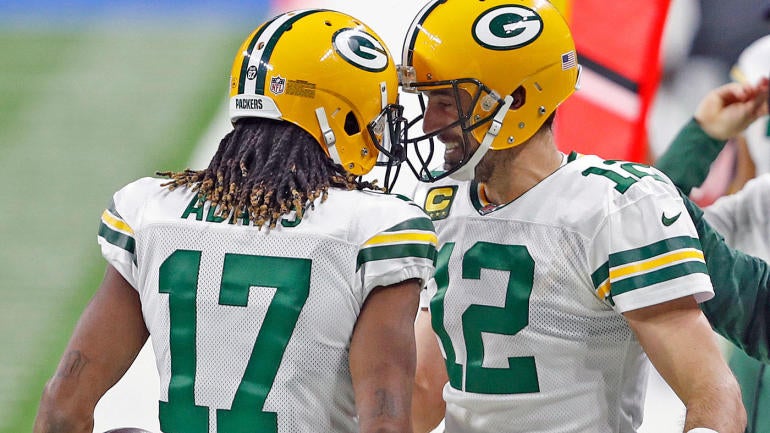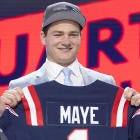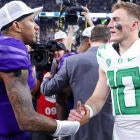
Davante Adams weighed in on the rift between the Packers and Aaron Rodgers last week. Green Bay should be concerned about the possible residual effects of Rodgers' discontent. "It doesn't mean potentially I'd be gone, but I'd definitely have to do some extra thinking if my guy (referring to Rodgers) wasn't here," Adams said during an interview on Fox Sports Radio when asked about his future in Green Bay.
The Pro Bowl wide receiver is entering the final year of a four-year, $58 million contract extension (with an additional $750,000 in salary escalators) signed at the end of the 2017 regular season. He is scheduled to make $13.25 million this year.
As a former agent, I took Adams' comment to mean the Packers are going to have to pay him a premium if he is going to be catching passes in the future from 2020 first-round pick Jordan Love, an unproven commodity, rather than the reigning NFL MVP. Typically, the Packers are proactive in signing core players to extensions before free agency is imminent. Even without the Rodgers issue, retaining Adams long term could be a difficult task.
Adams was arguably the NFL's best wide receiver in 2020. He was named All-Pro after catching 115 passes, the most ever for the Packers in a season, for 1,374 yards and 18 touchdowns. Adams led the NFL with 98.1 receiving yards per game. His 18 touchdown catches also led the NFL and tied a Green Bay single-season record.
Adams can make a case that he should be the NFL's highest-paid wide receiver not only because of his performance in 2020 but due to his consistency over the last three seasons. Since 2018, Adams ranks third in the NFL with 309 receptions, fourth in receiving yards (3,757) and his 36 touchdown catches are the most in the league. He is the only player to place among the top five in these categories for this three-year period.
DeAndre Hopkins tops the wide receiver pay scale with the two-year, $54.5 million extension he received from the Cardinals as the start of the 2020 regular season was approaching, although he had three years left on his existing contract. He is also the NFL's highest-paid non-quarterback at $27.25 million per year. The Hopkins contract has $49.4 million in guarantees where $42.5 million was fully guaranteed. His $27.5 million signing bonus is a record for a wide receiver.
Falcons wide receiver Julio Jones is second among receivers at $22 million per year. Keenan Allen (Chargers) and Amari Cooper (Cowboys) are the only other members of the $20 million-per-year pass catchers club at $20.025 million and $20 million per year, respectively.
Any Adams extension would need to set a new standard for signing bonus with wide receivers and favorable cash flow because of how Green Bay structures veteran contracts. The only guaranteed money in Green Bay deals is a signing bonus. The lone exception is Rodgers, whose deals have conventional contract guarantees.
The bigger deals contain a third or fifth day of the league year roster bonus in the second and third years. The roster bonuses are supposed to be substitutes for additional contract guarantees. The overall guarantees in Green Bay contracts are usually less than comparable deals on other teams.
The Packers don't have a great history in giving wide receivers a third contract. Greg Jennings left in 2013 free agency for the Vikings as a 29-year-old after an injury plagued 2012 season. The Packers had wide receiver depth in Randall Cobb, James Jones and Jordy Nelson at the time. Jones signed with the Raiders as a free agent the following year, on the verge of turning 30. He was never considered a legitimate No. 1 wide receiver. A 28-year-old Cobb joined the Cowboys in 2019 after his second contract expired. Cobb's last three seasons in Green Bay didn't meet expectations.
Nelson is the only one to get a third contract with the Packers. He signed a second extension in 2014, his contract year, at 29. Nelson was coming off a 2013 season where he caught 85 passes for 1,314 yards with eight touchdowns.
Adams, who turns 29 in December, plays a bigger role in Green Bay's passing offense than any of these guys ever did. The combined production of Green Bay's other wide receivers in 2020 didn't equal Adams'. Their collective production was 88 catches for 1,390 yards with 11 touchdowns. This group produced 86.9 yards per game. Barring a major injury to Adams or Rodgers getting traded, presumably to the Broncos, this dynamic is unlikely to dramatically change during the 2021 season.
Adams is a prime candidate for a franchise tag in 2022 absent a new deal. His nonexclusive franchise tag will be $20.12 million because it will be based off a 120 percent increase of his 2021 salary, which is essentially his cap number for these purposes.
It's hard to imagine the Packers letting Adams leave in free agency next year for just a 2023 third-round compensatory draft pick at best, despite the NFL's most challenging salary cap situation for 2022. The Packers have a league-high $224.42 million in 2022 cap commitments with 36 players under contract, according to NFLPA data. The top 51 salaries (i.e.; cap numbers) matter with offseason salary cap accounting rules.
The 2022 salary cap should be in the $195 million to $200 million neighborhood if the projections Bills general manager Brandon Beane recently revealed he was using for next year are accurate. This would give the Packers an overage between $40 million to $45 million with a complete top 51, before factoring in a potential Adams franchise tag.
Comparatively speaking, the salary cap gymnastics Green Bay would have to perform to accommodate Adams wouldn't be monumental, although not ideal. For example, the Saints had to shed over $100 million in cap commitments through contract restructures, releases and trades this year with the salary cap dropping by $15.7 million and still found a way to put a franchise tag on safety Marcus Williams.
The Packers would pick up $22.648 million of 2022 cap space by sticking to the original plan of having Love become Rodgers' replacement as early as next season. Dealing Rodgers could result in the closing of Green Bay's championship window.
It might make sense to explore franchising Adams and trading him under those circumstances. The draft capital the Vikings received for wide receiver Stefon Diggs would probably be more indicative of what the Packers could get for Adams than the Texans' return for Hopkins since the general consensus is the Cardinals fleeced Houston. The Bills gave up a 2020 first-round pick, a 2020 fifth-round pick, a 2020 sixth-round and a 2021 fourth-round pick to get Diggs and a 2020 seventh-round pick.





















